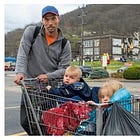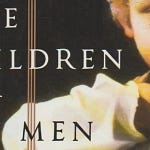Missed the homework assignment?
Show notes
[times are approximate (add 15 secs for the intro)]
2:13 | “…more odd now…” Indeed, check out this post about the book (now in its third edition) The Intellectual Life of the British Working Classes.
10:36 | Requisite shoutout to Charles Murray’s Coming Apart.
15:13 | “Minimum-Wage Earners Can Not Afford to Rent a One-Bedroom Apartment Across the Country” (Not the article George remembers, but it’s in that vein.)
16:48 | from G.K. Chesterton’s Orthodoxy:
Christianity even when watered down is hot enough to boil all modern society to rags. The mere minimum of the Church would be a deadly ultimatum to the world. For the whole modern world is absolutely based on the assumption, not that the rich are necessary (which is tenable), but that the rich are trustworthy, which (for a Christian) is not tenable. You will hear everlastingly, in all discussions about newspapers, aristocracies, or party politics, this argument that the rich man cannot be bribed. The fact is, of course, that the rich man is bribed; he has been bribed already. That is why he is a rich man. (169-70)
35:12 | Morgan Spurlock is the director of Super Size Me (2004). He died last year at the young age of 53.
1:05:10 | “…the great sort…” The phenomenon George is referring to here detailed in the book The Big Sort: Why The Clustering of Like-Minded America is tearing us apart (2008)
1:05:45 | On how Christian evangelicalism has become much more politicized, this new book by Jonathan Rauch looks very interesting: Cross Purposes: How Christianity’s Broken Bargain with Democracy. Bari Weiss has recently interviewed him about it.
1:07:08 | Iain McGilchrist, The Matter With Things: Our Brains, Our Delusions, and the Unmaking of the World (2021)
1:13:05 | In this fascinating piece, the author notes that Catholics are an outlier in terms of the difference between regular/non-regular attendance when it comes to a dip in support for gay marriage: while among other (Protestant) groups, the “backlash” is more pronounced among regular church attendees, this is not true for Catholics. George’s theory is that Mass is nearly 100% liturgy, and thus regular Mass goers are not more politicized by their more frequent attendance.
1:19:02 | Robert Putnam, Bowling Alone (2000)
Quotes
My teenage self had been a judgmental know-it-all, yet even understanding that now, I was right to have left my hometown. I wouldn’t have been comfortable living there…. The back row wasn’t for me, and it just wasn’t who I was. I valued science, and I valued different living experiences, and I believed I valued the true equality of all races.
A community built on non-credentialed value—place, faith, and race—didn’t work for me and excluded me. It excluded and excludes many, many others in far worse ways, many in the neighborhood I was now standing in. My hometown was still deeply segregated and divided by race. Sure, New York City was racially divided; sure, my wealthy neighborhood in Brooklyn was exclusive, but it at least strived for racial inclusion.
Put simply, my hometown’s intolerance didn’t fit my intolerance. My intolerance, like many in the front row, was credential-based. (280)
McDonald’s As Metaphor
What [all the places I visited] had in common was that all were poor and rarely considered or talked about beyond being a place of problems. All had been described as left behind, despite some, like Hunts Point [Brooklyn], being adjacent to rich and successful neighborhoods. Residents growing up in these communities faced immense structural obstacles, and some, like minority neighborhoods, had for a very long time.
Despite their differences—black, white, Hispanic, rural, urban—they were all similar to Hunts Point in one important way; despite being stigmatized, ignored, and made fun of, most of the people I met were fighting to maintain dignity.
They feel disrespected—and with good reason. My circles, the bankers, business people, and the politicians they supported had created a world where McDonald’s was often one of the only restaurant options—and we make fun of them for going there. We pretend that the addicted take drugs because of bad character, not because it’s one of the few ways they have to dull the pain of not being able to live good lives in the economy we’ve created for them. We tell them that their religion is foolish and that they shouldn’t expect to earn a living unless they leave their hometowns. We say the white working class is racist while the policies we endorse hurt the bulk of minorities. It is not surprising some have responded with cynicism or apathy, or rebel in anger. (17)
Non-credentialed Community
People respond to humiliation in different ways, but the most common response is to find a source of pride wherever possible, even if that means in places the status quo doesn’t approve of. It means trying to find a community or activity that values them. For those in the back row, that means a place that doesn’t demand credentials.
Drugs are one of them. Bars, drug traps, and crack houses offer communities that don’t care about your past, your failures, or the color of your sin. As long as you join in, shooting up or taking a hit or swallowing the pills, it is all OK. They also offer a numbing salve from the pain of humiliation. It is a reckless choice, but when your choices are limited, recklessness might be all you have.
Many churches offer that, especially Pentecostal and evangelical faiths. They offer a community with few barriers of entry, regardless of someone’s past. The only requirement is a desire to reform, to live a different way, to accept a set of rules on how you live your life and how you expect others to live….
Living in the place you grew up doesn’t require credentials. It’s a form of meaning that cannot be measured. Family doesn’t require credentials. Having a child is an action that provides meaning, immediate pride, especially for the mother, who can find value in raising a family.
There are other non-credential forms of community that come with far greater stigmas but can appeal to anyone frustrated enough.
Racial identity is one, providing a community that doesn’t require any credentials beyond being born. Like drugs, it is rightly stigmatized, but also like drugs, it can appeal to the desperate. (235-36)
Religion as Truth, Not Cope
When I walked into the Bronx I was an atheist, something I was sure about. Standing years later outside the Gospel Lighthouse in Bakersfield I wasn’t so sure. To my educated lifelong friends I might have said I was now agnostic, or still an atheist but one who appreciated religion.
To those inside the services I would say, “I appreciate the power of faith,” or “I understand the power of the Bible.” To the more direct and blunt questions, “Yes I read the Bible now and then, but I wouldn’t call myself religious” or “I have not been saved, but I do read the Bible.”
None of it was a lie, but the more direct truth was that even after I had come to see how useful religion was, I still attended services as an outsider trying to understand why faith drew so many people to it. Why it seemed to comfort those who needed it the most. In the language of the church, I wasn’t yet saved. In the language of my friends, I was a scientist trying to understand religion.
I now couldn’t ignore the value in faith, not as a scientist, not as a person who claimed to want to learn from others. Yet I still saw it as a utility—akin to a McDonald’s or even drugs. Something popular because it worked. Yet after attending hundreds of different services I was beginning to realize that there was more to it than that. My biases, my years steeped in rationality and privilege, were limiting a deeper understanding. That perhaps religion was right, or at least as right as anything could be. Getting there requires a level of intellectual humility that I am not sure I have. (117-118)
—
I had come back to my hometown because if I was going to document the back row, then I needed to look at my own town. Yet it took more than five years after I started my project before I had gotten around to doing so. I had stayed away despite an affection for my old neighbors, childhood friends, and others in the community because I didn’t feel I belonged there.
After I finished high school, I left, escaping into a series of colleges that ended with me working on Wall Street. In that time, I didn’t look back, didn’t care to look back, didn’t understand why anyone would want to look back. I had left because my hometown wasn’t for me. I was bookish, politically liberal, into science and math, and my hometown by and large wasn’t and made it clear that I was different.
When I was a kid I joined in, going to the Catholic school one block from my house. I had been an altar boy and loved church, because everyone around me did. As I grew older, I read more and more, and I ended up leaving the Church, escaping into what I then saw as truth: science and history books. (277-78)
A favorite quote
This exchange between Arnade and the owner of a strip club, the night of the Republican convention that nominated Trump in 2016.
HER: Come inside and be our first paying customer of the night.
ME: Thanks, but no thanks. I don’t drink anymore.
HER: You give up drinking?
ME: Yes, I had to a few years ago.
HER: See, everyone is going soft.
ME: You like Trump’s speech?
HER: Hell yes I do. Something has to change. This country is broken. No decent jobs, and you can’t party anymore. Guys used to come in here after a long day working and let loose a little. Now nobody is allowed to have any fun.
Another pause.
HER: [pointing to a woman playing Pokémon Go on her phone]: These kids spend all their time playing kids’ games on their phone.
She pauses, drags on her cigarette, while Trump speaks in the background. “This world is just going to the shitter.” (252-53)
















Share this post